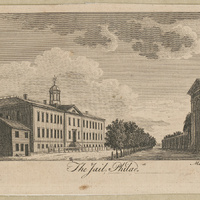 The Carceral State: Legal Histories of American Unfreedom The Carceral State: Legal Histories of American Unfreedom |
|
This teaching module discusses race, the carceral state, and the criminalization of Blackness, featuring a webinar with legal historian Taja-Nia Henderson.
|
 The Cherokee Removal Through the Eyes of a Private Soldier (1890) The Cherokee Removal Through the Eyes of a Private Soldier (1890) |
|
A former Army soldier presents a first-hand account of Cherokee removal.
|
| United States v. The Amistad (1841) |
|
This freedom suit originated after 53 Africans revolted and took control of the Spanish slave ship that intended to enslave them in Cuba. The ship was eventually seized by the U.S. Navy off the coast of Long Island and the Africans were taken into custody and charged with mutiny and murder. After a series of court appearances, the Supreme Court ruled that the Africans were "free negroes" who had been "unlawfully kidnapped, and forcibly and wrongfully carried on board" the Amistad. They were ordered to be released. After obtaining their freedom, missionary groups helped the surviving Africans return to Sierra Leone.
|
 Walnut Street Prison (1789) Walnut Street Prison (1789) |
|
An etching of the Walnut Street Prison in Philadelphia. Established as a city jail in 1773, it was expanded in 1790 to become the first state penitentiary in the new country. This prison was among the first to feature individual cells and was built to accommodate work details. The penitentiary was noted to have a larger percentage of Black inmates than white, noting the racialization of incarceration in the United States. The prison was in operation until 1838.
|
 Webinar - Latina/os and Criminal and Immigration Law Enforcement (2025) Webinar - Latina/os and Criminal and Immigration Law Enforcement (2025) |
|
In this webinar, Professor Kevin R. Johnson of the University of California, Davis, discusses the history of criminal and immigration law enforcement of Latina/os in the U.S with Dr. Donna D. Anderson and her And Justice For All class.
|
 Yarborough v. Alvarado (2004) Yarborough v. Alvarado (2004) |
|
In this case, the Supreme Court overturned a Ninth Circuit Court of Appeals ruling that stated that youth and inexperience with law enforcement should be accounted for when evaluating custody. In the majority opinion, the Supreme Court held that previous rulings had rejected reliance on factors such as age and inexperience in custody analysis.
|
 The Carceral State: Legal Histories of American Unfreedom
The Carceral State: Legal Histories of American Unfreedom The Cherokee Removal Through the Eyes of a Private Soldier (1890)
The Cherokee Removal Through the Eyes of a Private Soldier (1890) Walnut Street Prison (1789)
Walnut Street Prison (1789) Webinar - Latina/os and Criminal and Immigration Law Enforcement (2025)
Webinar - Latina/os and Criminal and Immigration Law Enforcement (2025) Yarborough v. Alvarado (2004)
Yarborough v. Alvarado (2004)